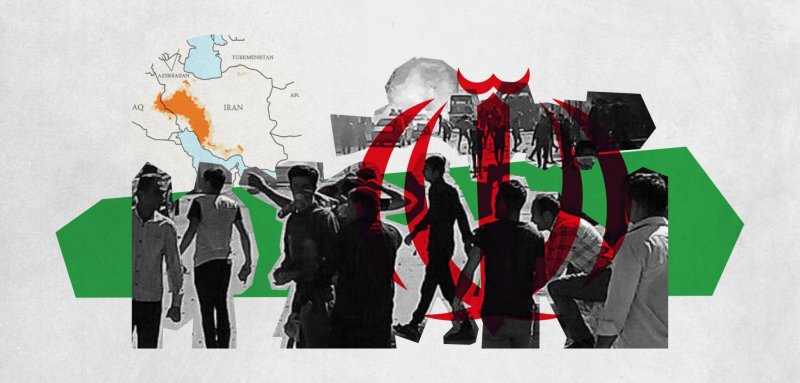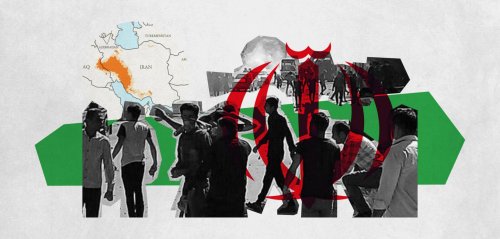Popular protests continue in the village of Teshnar Mahmudi near Lordegan, the capital of Chaharmahal and Bakhtiari province. The protests reached their peak on the 5th of October, when the town hall was set on fire along with the office of the Imam (leader of Muslim congregation) of the weekly Friday prayers.
The protests were captured in a widely-circulated video on social media on the 2nd of October, showing angry citizens in the village protesting and sitting-in in front of the village's health center, accusing officials in the village's clinic of transmitting AIDS to its residents through contaminated vaccinations and old needles repeatedly used in diabetes tests.
Following the widespread circulation of the video, the head of public relations in Iran's Health Ministry, Kiyanush Jahanpur, released a statement seeking to dispel "rumors" around the transmission of the virus through blood tests conducted for diabetes, declaring that the reports referred to an old case which took place eight years ago. Meanwhile, the head of the contagious diseases department in the Health Ministry, Mehdi Koya, described the news reports as "lies", pledging to pursue the issue through legal channels. Koya declared: "It is impossible for the Health Ministry to be implicated in such accusations, and if such accusations are true, then they should apply the death penalty against us."
The desire to politicize the recent AIDS infection crisis in Iran stems out of a feeling of marginalization and neglect of rural areas by the government in the fields of health and education but mostly a refusal to accept the shame AIDS brings on.
In #Iran’s Teshnar Mahmudi and many villages like it, poverty and illiteracy are widespread, prostitution in the form of "temporary marriages" is common coupled with drug use, all leading to a high HIV infection rate.
On a related note, the head of public relations at the faculty of medicine in the nearby city of Shahrekord, Majid Shirani, revealed several new incidents of AIDS being recorded in the village a month ago, while affirming that the Health Ministry dispatched a special team to spread public awareness to limit the spread of the disease.
Meanwhile, Iran's Health Minister Sa'id Nimki wrote to his counterpart, the Justice Minister, stating that the he would monitor the issue through legal means away from the public eye of the media, in order to safeguard the privacy of patient records in the area, while adding that the main cause for the disease spreading was drugs and sexual relations.
Contradicting Numbers
According to the statements by the parliamentarian Mohammed Husayn Qorbani, a member of the parliament's health committee, the population of the village is estimated to number 1,800 individuals, including 240 estimated to be drug addicts of which 20 who use needles. 26 residents are estimated to have been infected with the HIV, including a baby. By contrast, the head of the health center in the province of Chaharmahal and Bakhtiari claimed that the number of infections does not surpass 10 cases.
However, the representative of the city of Lordegan in the area's municipality, Mehdi Mahmoud Chelbetan, estimated that there were more than 200 cases of AIDS in the village.
AIDS Statistics in Iran
It should be noted that the Secretary-General of the international conference on AIDS in Iran, Massoud Murdani, had earlier stated (during the last sitting of the conference in November 2018) that there are 66,000 individuals infected with AIDS in Iran, almost split equally between men and women, while adding that the most common methods of the disease's transfer was through sexual relations and drug use. The Health Ministry officially documents 34,000 cases including 17,000 who are undertaking treatment, while the rest refuse to disclose their illness or receive treatment.
Political Slogans
Despite the arrest of the accused nurse who is alleged to have injected residents with the same needle, the anger of protesters has not abetted; indeed, the statements by the minister and other officials has converted the sit-in by the residents into protests that government media have labelled 'riots'.
The sit-in that began targeting the Health Ministry was soon transformed into a protest against the ruling regime in Tehran, raising the slogan "Not for Gaza and not Lebanon, my soul is sacrificed for Iran." The protests have spread outside the province to reach Isfahan, and are expected to spread further amongst the Bakhitari Lur tribe who inhabit the region – where ethnic and tribal affiliations play a significant role in this current wave of protests. The Bakhitari Lur tribe are known for their strong attitudes towards the concept of "honor" and their customs and traditions, not least including the widespread proliferation of arms amongst their members and many incidents of murder.
Indeed, it is impossible to separate the current crisis from the deteriorating economic situation that the poor regions of Iran are experiencing, including the village of Teshnar Mahmudi, where poverty, illiteracy and drugs are widespread, as well as prostitution in the form of "temporary marriages".
The recent AIDS infections are a result of medical mistakes, they have brought to the surface a repeated phenomenon whereby the tribal clans of Iran accuse officials in the health sector without accepting personal responsibility (unprotected sex, the consumption of drugs through needles). The desire to politicize the recent AIDS infection crisis in turn stems out of a feeling of marginalization and neglect of rural areas by the government in the fields of health and education.
The Iranian regime's security forces have since begun to repress the protests that have come out to condemn medical malpractice, holding the bodies of the Health Ministry accountable for the AIDS crisis; meanwhile, conservative media outlets have used the crisis to depict the weakness of the government of Hasan Rouhani.
Ultimately, it remains to be seen where today's protests will lead: will they spread further or will they encounter the same fate of the labor protests in Khuzestan which were ultimately repressed by security forces?
Raseef22 is a not for profit entity. Our focus is on quality journalism. Every contribution to the NasRaseef membership goes directly towards journalism production. We stand independent, not accepting corporate sponsorships, sponsored content or political funding.
Support our mission to keep Raseef22 available to all readers by clicking here!
Interested in writing with us? Check our pitch process here!




